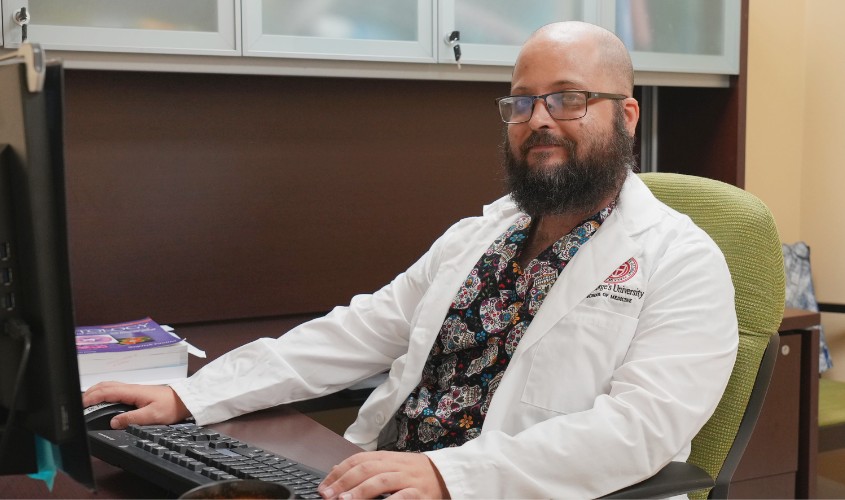SOM grad promotes inquisitive mindset as new head of Student Research Institute

While medical questions remain unanswered, students trained at St. George’s University’s Medical Student Research Institute (MSRI) will be armed with the foundation to discover those answers through research, this according to the institute’s new director, Michael Montalbano, MD/MBA ’16, an assistant professor in the Department of Anatomical Sciences at SGU.
Established in 2009, the MSRI offers Term 2 medical students looking to explore research—beyond standard research opportunities within the medical curriculum. Through the MSRI, students can develop their research with faculty mentorship and graduate with a Distinction in Research award. In the past, the MSRI has published hypothesis-driven research projects on outreach or public health interventions; case reports in collaboration with outside experts; and utilized the application of methods such as 3D printing, ultrasound, and virtual reality.
Recently appointed to head the MSRI, Dr. Montalbano revealed his goals for the institute, which includes cultivating a spirit of inquiry in aspiring physicians.
St. George’s University: What do you hope to achieve in your new role with the Institute?
Dr. Michael Montalbano: I want to achieve three things. First, I want to continue the good working relations between MSRI faculty and students. There are many faculty mentors doing important work while also giving students access to opportunities to build research skills that can be used later.
Next, I want to enable collaboration and thereby make the process easier for faculty and students to engage in research. This last year has shown us the importance of understanding new problems and acting to resolve them with relevant data. Collaboration is essential to tackle a deluge of data, and I hope to encourage more SGU faculty to become mentors or join in research endeavors in whatever way they can.
And lastly, we must continue to nurture an inquisitive mindset in MSRI students. I want the MSRI to give students the skills that accompany sound scientific approaches to complement the large volume of medical knowledge they learn from their classes. I believe that armed with the proper cognitive exploratory tools, a student can better map out the dense territory of medical facts, make an informed clinical decision when faced with a choice of paths, and perhaps even start a trail of knowledge in previously uncharted terrain. In short, I want to not just keep curiosity alive but actively promote it.
“I want the MSRI to give students the skills that accompany sound scientific approaches to complement the large volume of medical knowledge they learn from their classes.”
SGU: What type of research is currently being done at the MSRI?
MM: Although off campus this last year, MSRI has been conducting investigations involving electronic surveys, reviews, and statistical analyses of topics ranging from complementary medicine to clinical cases. With the start of the new term approaching and new minds joining us, I’m looking forward to what additional avenues will be pursued next.
SGU: What research topics you would like to see covered in the future?
MM: In the future, I’d like to see studies that can sift through the vast amount of data on the changes that have occurred in the past year. I think there will be large downstream effects in public health and widespread digitization of information, which means much more accessibility than in the past. I’m confident that those joining MSRI who are curious and capable will have great ideas that we can sharpen into formal studies.
SGU: What are some of the benefits to students who participate in research at the MSRI?
MM: MSRI offers a chance to improve the competitiveness of those students who are seeking more specialized residencies by allowing them to perform research and gain experience in writing papers and/or presenting at conferences. MSRI students are also given the opportunity to apply for a one-time reimbursement of US$1,000 if they are the first presenting author selected to present at a recognized conference.
Essentially, MSRI students get to take their knowledge and apply it towards real unknowns—by giving them a background that makes it easier to participate in research opportunities in the future and helping to grow confidence in their scientific literacy when learning about new findings.
SGU: As an SGU grad, what does it mean to you to be appointed as head of the MSRI?
MM: I feel very grateful to be given the opportunity to head the MSRI. For me, the appointment means I am tasked with letting the program continue to grow and adapt as any good research body should. I hope to do it justice and continue the good work that Dr. Martin Forde has done in past terms.
SGU: Why did you choose a career in academic medicine that focuses on helping future physicians with research opportunities?
MM: All physicians, in some way, have a duty to master, update, and pass on medical knowledge. With a primary role in academic medicine, I can contribute to student experiences that later codify into what graduates will do for patients and the broader medical community. With research specifically, that means providing the ability to understand the limitations of previous evidence, seek out new findings, and correctly synthesize what one knows to better oneself and others. As the original root of the word “doctor” means to show or teach, I feel this is apt. I hope as head of MSRI my colleagues and students will feel so too.
– Ray-Donna Peters

